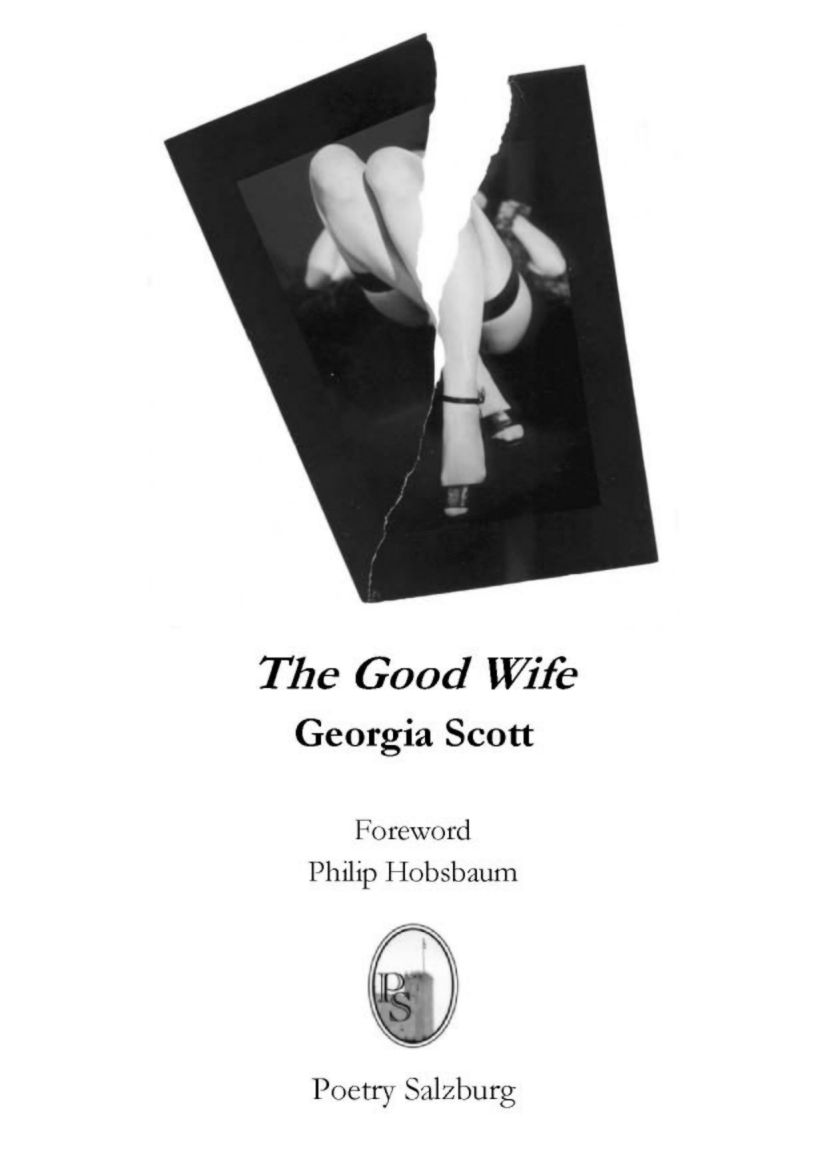 | Georgia Scott
The Good Wife2nd revised edition September 15, 2002. 64 pp. ISBN-13 978-3-901993-09-1; ISBN-10 3-901993-09-6
£8.50 (+ 2.00 p&p), €9.00 (+ 2.00 p&p), US$ 11.00 (+ 3.00 p&p)
The poems of Georgia Scott are based on and around one theme. That themeis Poland after the War under Communist rule. The visual technique of thesepoems is akin to that of the camera. Characteristically, they are blackand white, apparently straightforward in imagery, but in fact shrewdlyangled to allow for emotion. It is emotion of a wry sort, both disillusionedand stoical. Philip Hobsbaum, Introduction Georgia Scott provides us with terse but vibrant images, tensed voicesand even tenser lives, stories that gather momentum each time you readthem through. Daniel Bourne, Artful Dodge A brilliant collection that I recommend without reservation. Paul McDonald, New Hope International Review On-Line |
Excerpts from The Good Wife
The Witness
It's been awful. Haven't you heard?
For the past two weeks they've been calling.
My God I haven't slept.
They keep calling
late at night. The first time
they said there'd been an accident
I should go to the station and give a report.
I said I'd seen no accident.
And they said come down
or we'll come for you ourselves.
So I went.
They said I was a witness.
I said to what? And they laughed.
They said did I ever want a passport
did I ever want to go abroad again.
Then I laughed.
You know
(she said, taking a sip from her glass)
the littlest things can matter –
when a colleague goes to lunch
or takes a break.
The littlest things.
More coffee? Or was yours tea?
World War II, or The English Lesson
It's just too much to say.
The "w's" make a comedy of her mouth.
The lips, so lush in Polish,
wobble back and forth,
do a Marilyn Monroe walk
in skirts so tight
every step is a pain.
History
Rye-colored sky. A confetti of slim white birds.
The family of potato pickers, eyes on the ground, move
through swells of dust and sun
leaving the cow chained to the grass
beside the road, a cart horse like a shop girl
droops its head, chewing slow
the Virgin in an arch of multicolored bulbs
awaits in the shadows for the evening to come on
a police car watches from the trees
something bleeding on the road
the mother pulls the child closer
in the bus shelter, the couple press
together like an envelope without glue
a pond glistens
dogs bark from the village
signs like mushrooms appear
offering forks, beds, crosses on fire
the last to mark the massacre
in the woods outside
that village that on maps
is nothing but empty space.
Reviews:
"The inseparability of the personal and political is at the heart of contemporary women's poetry,and Georgia Scott's poems in The Good Wife, set in post-war Communist Poland, bring new perspectivesto this theme by inhabiting the point of view of Polish citizens living during this time. [...]Her poems are plain spoken and graceful, and they evoke in vivid ways the tension and terror ofliving under siege, and the noble significance of everyday acts in such circumstances. [...]Scott's poems, like the citizens who speak or are described in them, are unpretentious and direct.Favoring shorter, enjambed lines, they are able to maintain a strong lyricism, employing repetition,surprising line breaks, and clear images that speak for themselves, rather than the more compleximage-clusters common to much modern and contemporary American poetry. More than any other element,it is the strong, spare images that carry the powerful sense of foreboding, a sense that pervadesthe collection as a whole. But this foreboding never gives way to dread."
Ernest Smith, "Holding Off the Darkness", Cold Mountain Review 32.1 (Fall 2003), pp. 59-61.
"In Scott's world, Poland under Communism, the good wife does what she needs to do - to keep going, to remain alive,to feed her family, to find toilet paper and batteries. She views the Polish society from the perspective of aninsider avoiding the secret police, scowling disdainfully at the peasant/workers' paradise presented in so manybanners and billboards and festivals ('the ribboned dancers'), the lines for food and other necessities, thetwenty-year waiting list of a studio apartment in a poorly constructed concrete block building. Her stance isdecidedly anti-Romantic-she is no Byron or Shelley, posing, then rushing off to liberate a captive country. Thesepoems are fierce packets of stoic disillusionment, what Philip Hobsbaum calls in his foreword to the collection,poems that are 'black and white, apparently straightforward in imagery, but in fact, shrewdly angled to allow foremotion.' They are poems that during an earlier period of Communist rule, throughout the Eastern Bloc, would leadstraight to a re-education camp."
Leonard Kress, "Everything's Better in Poland", Artful Dodge 46/47 (Fall 2005).
Read the full review at Artful Dodge
Read more about Georgia Scott
Send an e-mail to order this book
